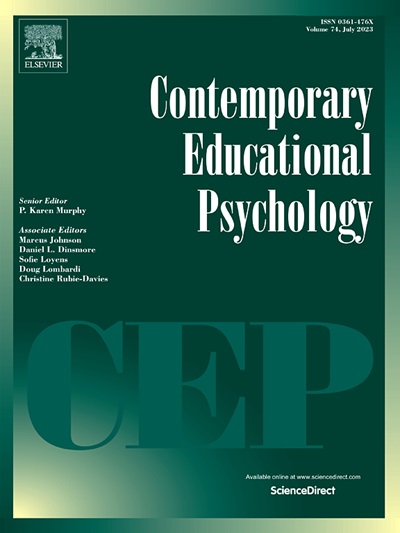当学生阅读多篇说明性文章时,关注著名术语可促进叙事框架分析
IF 3.8
1区 心理学
Q1 PSYCHOLOGY, EDUCATIONAL
引用次数: 0
摘要
叙事框架指的是媒体信息的转播、组织和语境化方式,目的是为学习者提供新内容的结构和参照框架。叙事框架无处不在,并被发现会影响个人对各种社会问题的态度和理解。然而,以往的研究很少考察学生在阅读过程中识别和分析叙事框架的能力。在本研究中,我们考察了两种实验操作是否能够提高学生在阅读四篇涉及当代社会问题(即拟议中的新住房开发项目)的文章时对叙事框架的关注和分析。我们采用了实验设计。学生(N = 141)在阅读前被随机分配接受或不接受叙事框架的定义,并被要求在阅读过程中识别或不识别值得注意的术语。然后,学生们被要求阅读四篇文章,文章从不同的对比角度介绍了一个新的经济适用房开发项目的建设情况。最后,学生们完成了开放式问题,对公开和隐蔽的叙事框架进行识别和分析,并对多个文本进行整合。虽然向学生提供叙事框架的明确定义并没有提高成绩,但要求学生在阅读过程中注意明显的术语却提高了公开叙事框架分析的分数。此外,学生在阅读过程中识别出更多值得注意的术语与更高的公开和隐蔽叙事框架分析成绩有关。在阅读过程中注意值得注意的术语可能是促进学生分析公开和隐蔽叙事框架的一种方法。本文章由计算机程序翻译,如有差异,请以英文原文为准。
Attendance to notable terms promotes narrative frame analysis when students read multiple expository texts
Narrative frames refer to the ways in which information in media is relayed, organized, and contextualized, in order to provide learners with a structure and a frame of reference for new content. Narrative frames are pervasive and have been found to have an effect on individuals’ attitudes and understandings of various social issues. However, students’ abilities to identify and analyze narrative frames during reading have rarely been examined in prior work. In this study, we examine whether two experimental manipulations are able to increase students’ attendance to and analysis of narrative frames when reading four texts addressing a contemporary social issue (i.e., a proposed new housing development). An experimental design was used. Students (N = 141) were randomly assigned to receive a definition of narrative frames, or not, prior to reading and asked to identify notable terms during reading or not. Then, students were asked to read four texts, offering various contrasting perspectives on the construction of a new affordable housing development. Finally, students completed open-ended questions tapping overt and covert narrative frame identification and analysis and multiple text integration. Although providing students with an explicit definition of narrative frames did not improve performance, asking students to attend to notable terms during reading improved overt narrative frame analysis scores. Additionally, students identifying more notable terms during reading was associated with higher overt and covert narrative frame analysis performance. Attending to notable terms during reading may be one means of fostering students’ analysis of overt and covert narrative frames.
求助全文
通过发布文献求助,成功后即可免费获取论文全文。
去求助
来源期刊

Contemporary Educational Psychology
PSYCHOLOGY, EDUCATIONAL-
CiteScore
16.50
自引率
3.90%
发文量
74
期刊介绍:
Contemporary Educational Psychology is a scholarly journal that publishes empirical research from various parts of the world. The research aims to substantially advance, extend, or re-envision the ongoing discourse in educational psychology research and practice. To be considered for publication, manuscripts must be well-grounded in a comprehensive theoretical and empirical framework. This framework should raise critical and timely questions that educational psychology currently faces. Additionally, the questions asked should be closely related to the chosen methodological approach, and the authors should provide actionable implications for education research and practice. The journal seeks to publish manuscripts that offer cutting-edge theoretical and methodological perspectives on critical and timely education questions.
The journal is abstracted and indexed in various databases, including Contents Pages in Education, Australian Educational Index, Current Contents, EBSCOhost, Education Index, ERA, PsycINFO, Sociology of Education Abstracts, PubMed/Medline, BIOSIS Previews, and others.
 求助内容:
求助内容: 应助结果提醒方式:
应助结果提醒方式:


